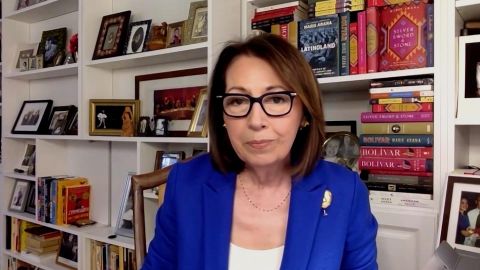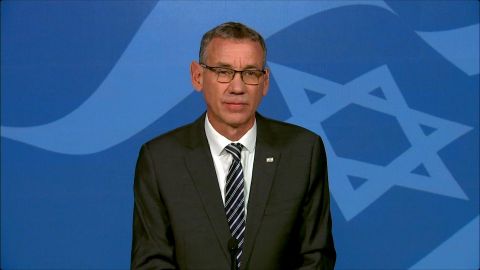Read Transcript EXPAND
CHRISTIANE AMANPOUR, CHIEF INTERNATIONAL ANCHOR: Joining me now is Mark Regev. He’s special adviser to the Israeli prime minister, Benjamin Netanyahu. Welcome back to the program, Mark Regev. As I said, there are disputed timelines, either the shooting was first and then the stampede, or the stampede was first and then the shooting, but the facts are the facts, there are dead and injured. I think the first question, if you could answer, is who were this aid — who was this aid being driven in by or for? The U.N. and the normal, you know, known aid agencies said that they had nothing to do with it. Do you know who it was?
MARK REGEV, SPECIAL ADVISER TO THE ISRAELI PRIME MINISTER: I know the following, that in order to help alleviate the food shortage in Gaza, that we authorized a convoy of, I think, some 30 trucks entered Gaza last night, headed for the Northern Gaza Strip. And this shows that Israel is interested in seeing aid and foodstuffs reach the civilian population. Unfortunately, we saw a situation where there was a mass casualty — tragedy where it looked like the civilians were storming the trucks, trying to take the food out of desperation. And people — a crowd was pushing and shoving and people were killed. I can’t tell you the exact numbers. I don’t — as you know, I don’t trust the numbers put out by the Hamas controlled Ministry of Health in Gaza. There were reports that maybe their drivers were driving over parts of the crowd. It appears to be a tragedy, but I can tell you Israel was not involved directly in any way.
AMANPOUR: When you say not involved directly in any way, what do you mean? I mean, you enabled this convoy, as you said, and your forces are there on the ground and open fire. They said it themselves. What does that mean, not involved in any way?
REGEV: So, this was, we — well, we allowed the aid to come in. We are involved that way. That’s our policy to allow food to go into Gaza for the civilian population. But in the incident of people storming the trucks and the way the truck drivers behaved and people getting squashed and pressed and apparently, they’re being mass casualties, Israel was not there on the ground.
AMANPOUR: OK. But they did open fire and people were killed. So, I’m completely confused by what you’re saying because they admitted, the IDF spokesman said it. Said it on our air, that they opened fire.
REGEV: That’s a separate incident.
AMANPOUR: OK.
REGEV: Not connected to the tragedy with the trucks. And that was different place, different time. In the general location, but not the same incident at all.
AMANPOUR: All right.
REGEV: And I have to tell you that we are not aware that the IDF fired caused casualties at all.
AMANPOUR: Well, I can tell you that a journalist whose CNN works with on the ground has a different view of it. But maybe there were other incidents. That obviously you say are — is under review and we will hope to get further clarification. But here’s the thing. So, Israel is the only force in charge of security by your own announcements, by your own volition, by your own actions over the last, you know, five months or so there. It is, as everybody is saying, Israel’s responsibility therefore, if you let these trucks in to provide security. And this obviously comes in the context of so little food going in that people are desperate, as we’ve heard from the international forces. So first, aren’t you the only law enforcement people in the Gaza Strip right now?
REGEV: Unfortunately, Hamas has not yet been completely destroyed, and I should have been clearer.
AMANPOUR: OK.
REGEV: In that — in the first incident of the truck being swamped by civilians, there was gunfire, but it wasn’t Israeli forces. There weren’t Israeli forces on the trucks or around the trucks. That was Palestinian armed groups. We don’t know if it was Hamas or other armed groups, but there definitely was fire, that we do know.
AMANPOUR: OK. So, my question again is Israel is the only law enforcement operation on the ground as you wage this war. Therefore, if you allow these trucks in, who do you expect to provide the security for them? Because every convoy needs security. I mean, I’ve covered this from, you know, time immemorial, back from Bosnia to Somalia and elsewhere. It all requires discipline, organization, and coordination, and security. Who do you think should have been responsible for security in the convoy that you allowed in?
REGEV: So, it’s a difficult question and we’re grappling it — with it, and we’re talking to the International Community, to the aid organizations, to the United Nations, to other partners who are relevant in this conversation because, of course, we want to see the aid safely Reach the people. Now, it’s quite possible. As you know, Hamas has been stealing aid, that’s been documented. We’ve heard people in Gaza complain about this. So, is it possible that people in Gaza don’t trust that this aid that the International Community is giving to the people of Gaza is actually reaching the people of Gaza and not being siphoned off by the terrorists? That could be one of the reasons to explain what’s going on.
About This Episode EXPAND
More than one hundred people have been killed whilst gathered around food aid trucks in Gaza city. Mark Regev joins the show. Tech journalist Kara Swisher is chronicling her career in a new memoir, “Burn Book.” “LatinoLand” author Marie Arana on the impact of the Latino vote in the upcoming election. Josh Paul resigned from the State Department soon after Oct. 7th in protest. He joins the show.
LEARN MORE

